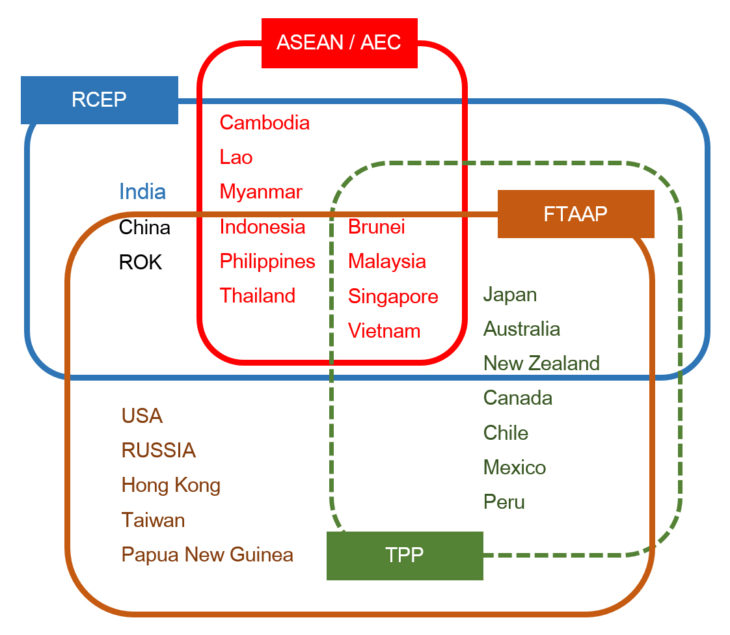Interviewing an Expert on International Trade Efforts to Implement the TPP Fail — Exercise Leadership to maintain a high level of trade negotiations
The TPP is an agreement that was reached to create a huge value chain in the Asia-Pacific region. With its implementation becoming uncertain, what role is expected of Japan in trade negotiations?
Editorial department of Wedge: Why does it make sense for Japan to ratify the Trans-Pacific Partnership (TPP) as soon as possible, while President-elect Trump says that he will announce the United States’ withdrawal from the TPP on the day of his inauguration?

Urata Shujiro, Dean and Professor of Graduate School of Asia-Pacific Studies at Waseda University
Urata Shujiro: The TPP will be implemented if either the twelve nations complete the domestic procedures within two years after signing in February 2016, or if more than six nations accounting for 85% of the total GDP of the twelve nations complete them, even after two years have passed. I do not expect that Trump will change his campaign promises before the mid-term election. That said, even if the United States, which holds the key to the implementation, announces its withdrawal at this time, the TPP will not disappear. Since the road to future implementation is not closed, countries other than the United States should move forward with their efforts for ratification and be prepared to implement the TPP at any time.
With the Japanese market clearly shrinking due to the declining population, Japanese companies must generate revenues in overseas markets and return them to Japan to ensure that the country’s prosperity will be maintained going forward. In particular, a mega-FTA needs to be promoted in the Asia-Pacific region to ensure that revenues are raised in the Asia-Pacific market where further growth is expected. If nothing else, it is extremely important for Japan to form the TPP, in which rules for a high level of liberalization and transparency are enforced.
Mainstream Republicans and industries of the United States recognize that the country needs the TPP. We expect them to persuade Trump. At the same time, it is important for Japan to continue highlighting the meaning of the TPP.
Some countries participating in TPP negotiations have come up with the idea of implementing the TPP among eleven countries (TPP 11), excluding the United States. Does the TPP 11 have any advantages for Japan, and how likely is it that it will be formed?
 Little progress was made in TPP negotiations on the removal of the United States automobile tax barriers. As a result, from the perspective of trade with the United States alone, the TPP 11 without the United States will not have a more favorable impact on Japan. That being said, it is important to implement the TPP 11 if it is agreed based on the concept of high-level rules under which trade liberalization ratios and transparency are increased in the Asian market and fairness is guaranteed.
Little progress was made in TPP negotiations on the removal of the United States automobile tax barriers. As a result, from the perspective of trade with the United States alone, the TPP 11 without the United States will not have a more favorable impact on Japan. That being said, it is important to implement the TPP 11 if it is agreed based on the concept of high-level rules under which trade liberalization ratios and transparency are increased in the Asian market and fairness is guaranteed.
Nevertheless, I suspect that it will be difficult to realize this idea. The reason is that the major factor contributing to the TPP agreement was the significant advantage of improving access to the huge United States market. With that in mind, countries had been making concessions on a range of regulations. Without the advantage of better access to the United States market and pressure from the United States, I do not expect a high level of liberalization to be achieved or negotiations to end in agreement.
As we see the US-led TPP drifting into failure, how should Japan move forward with negotiations on the Regional Comprehensive Economic Partnership (RCEP) for an economic zone centered on China?
China, while reportedly taking a leading role in the RCEP, has not been engaging very actively in FTA negotiations. The country is not in a position to facilitate a high level of free trade because it inflicts serious damage on the country’s own industries. The same reason applies to the standstill in the progress of FTA negotiations between Japan, China and Korea.
China places greater emphasis on facilitation instead of liberalization in its trade strategy nowadays. Based on the concept of “One Belt & One Road,” the country was working to facilitate smoother trade by improving connectivity to markets through the construction of infrastructure. However, it has recently renamed it the “Belt & Road Initiative” to further facilitate trade based on the concept of a plane instead of a line.
Japan does not need to take a stance of staying away from RCEP-driven trade negotiations. For Japan, any improvement in access to the Asia-Pacific market is a significant advantage. The question is whether or not a high level of liberalization will be achieved. Japan should lead negotiations to pursue a high level of results, as it achieved in the TPP. It would also be ideal if it could eventually encourage the United States to remain, while at the same time facilitating the involvement of other countries that have shown interest in the TPP, such as Indonesia, the Philippines, Thailand and Korea.
With Trump attaching importance to bilateral trade, how should Japan respond if it is requested to conclude an FTA between Japan and the United States?
From an economic perspective, such an agreement may not be particularly advantageous. With negotiations conducted between the two countries alone, the United States will find it even easier to push through its demands regarding automobiles and agricultural products. Such a situation would be more disadvantageous to Japan.
Even so, considering factors such as the strengthening of the relationship between the two countries and security issues, among other factors, Japan cannot make a flat apathetic gesture. In the course of the discussions between the two countries, Japan should spare no efforts in ensuring that the other party understands that a multinational framework is beneficial to the United States as well.
Translated from “Interview: Kokusaiboeki no senmonka ni kiku ― Tonzashita TPP hakko, kosuijun no bouekikosho wo shudoseyo (Efforts to Implement the TPP Fail ― Exercise Leadership to maintain a high level of trade negotiations),” Wedge, January 2017, pp. 32-33. (Courtesy of WEDGE Inc.) [September 2017]


